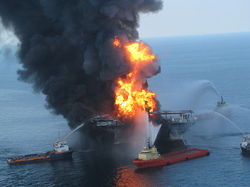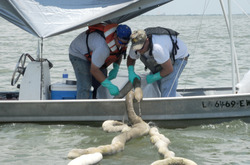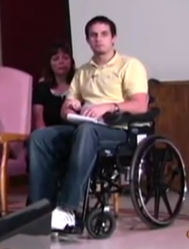POISONED IN THE GULF
A year after the BP oil catastrophe in the Gulf of Mexico, a growing number of cleanup workers and coastal residents are reporting debilitating health problems associated with exposure to toxic chemicals in crude oil and dispersants. Faced with inaction from the federal government, victims are organizing a grassroots movement to demand action.
A special Facing South investigation by Sue Sturgis
"Already, this oil spill is the worst environmental disaster America has ever faced. And unlike an earthquake or a hurricane, it's not a single event that does its damage in a matter of minutes of days. The millions of gallons of oil that have spilled into the Gulf of Mexico are more like an epidemic, one that we will be fighting for months and even years."
-- President Obama, Oval Office Address, June 15, 2010
 Clayton Matherne was just a quarter-mile from BP's Deepwater Horizon oil rig when it exploded into flames a year ago today in the Gulf of Mexico, killing 11 workers, injuring 17 others and triggering the largest oil spill in U.S. history.
Clayton Matherne was just a quarter-mile from BP's Deepwater Horizon oil rig when it exploded into flames a year ago today in the Gulf of Mexico, killing 11 workers, injuring 17 others and triggering the largest oil spill in U.S. history.
At the time, Matherne worked as a boat engineer for Guilbeau Marine, shipping supplies for rig workers. He struggles for words to describe what he witnessed that fateful night.
"It still gives me nightmares today," he says.
But Matherne's nightmares were just beginning. Two days after the blast, Matherne -- a resident of the small town of Lockport in Louisiana's Lafourche Parish -- found himself back at the site of the disaster. BP contracted with Guilbeau Marine to help with the oil cleanup.
Less than an eighth of a mile from where Matherne was skimming oil, other contractors were trying to burn oil off the water's surface, unleashing massive plumes of black smoke into the air. Meanwhile, low-flying planes dumped chemical dispersants on the growing slick -- and directly on Matherne and his fellow cleanup workers.
From the very beginning, Matherne says, he and other workers asked for basic safety equipment -- chemical suits and respirators -- to protect them from the pollution that was everywhere around them. BP refused to provide any.
"So we went and bought our own," Matherne says. "But BP told us that if we were caught using it, we were fired."
Almost immediately, Matherne and his fellow workers began experiencing severe headaches and breathing problems. Some workers passed out on the job. Matherne went to the emergency room and was diagnosed with "reactive airway disease secondary to chemical exposure" and sent back to work. Eventually Matherne began vomiting blood. His captain called the BP official overseeing the cleanup operations and told him he feared his employee was dying.
On May 30, Matherne was airlifted to shore and sent to an emergency clinic, where he says he was diagnosed with acute chemical poisoning. Today his blood still has high levels of some very dangerous toxins, including benzene, arsenic, mercury and xylene. Many of the chemicals in his blood commonly show up after exposure to crude oil. He was eventually transferred to Terrebonne General Medical Center in Houma, La., where he spent five days choking up blood. He was treated with high doses of steroids and released.
Today, Matherne's lungs are working at only a fraction of their capacity, and he experiences paralyzing headaches. He's losing control over his bodily functions and faces the possibility of having to wear diapers -- a terrible prospect for a 35-year-old man who before the BP disaster trained as a power lifter and wrestler and prided himself on his physical strength.
"I can't even pick up a gallon of milk from the icebox now," he says. "My wife has to help me put on my shoes."
 'Something I've never seen'
'Something I've never seen'
Unfortunately, Matherne's story is not an unusual one on the Gulf Coast a year after the BP disaster. An investigation by Facing South finds that people across the region from Louisiana to Florida -- cleanup workers as well as coastal residents who weren't directly involved in the cleanup -- are reporting unusual health problems that they blame on the oil spill and the chemical dispersants that were deployed in unprecedented amounts.
Marylee Orr, executive director of the Louisiana Environmental Action Network, says she fields a couple of calls a day from people who say they were exposed to BP oil and/or chemical dispersants and who now report an array of health problems, including respiratory and gastrointestinal disorders, blurred vision, rashes and other skin conditions, bleeding from the rectum and ears, and bloody urine.
Following Hurricane Katrina, Orr's group assisted cleanup workers who experienced health impacts from exposure to chemicals and pathogens churned up by the storm, but she says those problems pale in scope and severity to what's unfolding now.
"I want you to understand, it is something I've never seen, and I've been doing this work for 25 years," Orr says.
Among the mounting pieces of evidence that the BP spill has unleashed a new set of public health threats in the Gulf:
* Preliminary findings of a BP spill coastal population impact study [pdf] released last August by the National Center for Disaster Preparedness at Columbia University found that over 40 percent of the population living within 10 miles of the affected coastal areas had experienced some direct exposure to the oil spill, and that both adults and children directly exposed to the oil were twice as likely to report new physical or mental health issues as those who were not.
* A door-to-door survey of 954 households conducted across Southeast Louisiana from July through October of last year by the Louisiana Bucket Brigade found that 46 percent of respondents reported being exposed to oil or dispersant, with 72 percent of those who believed they were exposed reporting at least one associated symptom. Residents reported a sudden onset of symptoms including nausea, dizziness and skin irritation -- all of which are representative of chemical exposures.
* Earlier this year, LEAN released the results of tests performed on blood samples collected from a dozen Gulf residents, fishers and cleanup workers who complained of health problems they believed to be related to the oil spill. All of those tested had high blood levels of ethylbenzene, a component of crude oil that causes respiratory and neurological problems as well as damage to the blood, liver and kidneys. Eleven of those tested had relatively high concentrations of xylenes, a chemical in oil linked to respiratory and neurological problems as well as organ damage. Four of the people tested showed unusually high levels of benzene, a constituent of oil that's known to cause blood cancer and other serious health problems.
* A team of three scientific divers who worked in the area near the BP oil spill site last summer while wearing full wetsuits report that they began to develop unusual symptoms and by October quit diving. However, they have continued to suffer from health problems that include bloody stools, bleeding from the nose and eyes, nausea, diarrhea, stomach cramps, dizziness and confusion. They have had their blood tested and discovered elevated levels of ethylbenzene and xylene.
 * A number of people who swam in Gulf waters during the oil spill have stepped forward to talk about long-term health problems they believe are related to their exposure to the oil and/or chemical dispersants. They include Florida resident Paul Doomm, who was a healthy 22-year-old about to join the Marine Corps when he swam on an open beach off the Florida Panhandle early last summer. By July he began suffering severe headaches, and by Thanksgiving he was paralyzed on the left side of his body and suffering from seizures. He was diagnosed with brain lesions. Meanwhile, Mississippi resident Steven Aguinaga reports that since swimming at Fort Walton Beach in Florida last July he began suffering from chronic chest pain, bloody urine and vomiting. A 33-year-old friend who went swimming with him and then went to work on the BP cleanup also got sick and died suddenly in August.
* A number of people who swam in Gulf waters during the oil spill have stepped forward to talk about long-term health problems they believe are related to their exposure to the oil and/or chemical dispersants. They include Florida resident Paul Doomm, who was a healthy 22-year-old about to join the Marine Corps when he swam on an open beach off the Florida Panhandle early last summer. By July he began suffering severe headaches, and by Thanksgiving he was paralyzed on the left side of his body and suffering from seizures. He was diagnosed with brain lesions. Meanwhile, Mississippi resident Steven Aguinaga reports that since swimming at Fort Walton Beach in Florida last July he began suffering from chronic chest pain, bloody urine and vomiting. A 33-year-old friend who went swimming with him and then went to work on the BP cleanup also got sick and died suddenly in August.
BP spill-related health problems have been an urgent topic of discussion at various public forums held to discuss the disaster. During a meeting in New Orleans in January to discuss the report released by the National Commission on the BP Deepwater Horizon Oil Spill, many Gulf residents described lingering health concerns, with attendees extracting a promise from Commissioner Francis Beinecke of the Natural Resources Defense Council to take their concerns back to the White House. Health worries also came up repeatedly during a Feb. 28 meeting of the Gulf Coast Ecosystem Restoration Task Force in New Orleans.
In March 2011, John Jopling -- an attorney with the nonprofit Mississippi Justice Center -- attended a town hall meeting in Bay St. Louis, Miss., one of a series organized by state Attorney General Jim Hood. Jopling went expecting to hear complaints about BP's complex and frustrating claims process; instead, person after person spoke about health problems they attributed to the spill and/or dispersants.
"We were all blown away by what we heard there," Jopling reports. "Nothing prepared me for it."
He describes how three men told strikingly similar stories about their experiences scouting oil for BP and then developing a chronic blistering, peeling skin condition on their arms that they displayed for the shocked crowd. All said they had difficulty in finding doctors willing to treat them.
Attorney General Hood also seemed surprised. "One of the things that kind of startled me are the people that are concerned about breathing in the fumes, particularly last summer, the effects from it," Hood later told Mississippi Public Broadcasting. "Many are having effects and there are no doctors here than can really analyze whether it may be as a result of this oil explosion."
Hood said he would look into having the state health department or the federal Centers for Disease Control and Prevention do some testing in the area.
A lack of options
That a leading Gulf state official was just considering the possibility of contacting federal health authorities, nearly a year after BP's rig explosion, underscores what many see as a breakdown in the government's public health response to the disaster.
The BP spill commission noted the shortcomings in the ability of current law to address such hazards, recommending that the government be given more power to monitor health impacts. The report also called for long-term tracking of responders' health and community health in the most affected coastal areas, calling such efforts "warranted and scientifically important." Indeed, last September the National Institutes of Health announced that it was undertaking a $20 million study looking at potential impacts of the BP spill on cleanup workers.
"However," the report states, "the focus on long-term research cannot overshadow the need to provide immediate medical assistance to affected communities, which have suffered from limited access to healthcare services." It notes that the health care infrastructure in the Gulf was badly damaged by Hurricane Katrina in 2005.
 The lack of medical options for the BP spill victims is a reality familiar to Matherne, who -- like others in the wake of the disaster -- has had a hard time finding a doctor willing to treat him. He says several hung up the phone as soon as he said he got sick doing cleanup work for BP. He figures they didn't want to get involved because of the possible legal ramifications.
The lack of medical options for the BP spill victims is a reality familiar to Matherne, who -- like others in the wake of the disaster -- has had a hard time finding a doctor willing to treat him. He says several hung up the phone as soon as he said he got sick doing cleanup work for BP. He figures they didn't want to get involved because of the possible legal ramifications.
Eventually he found Dr. Mike Robichaux of Raceland, La., an ear, nose and throat specialist and former state senator who has stepped forward to provide free care for people who believe they have been sickened by the BP spill and to advocate for their needs. Robichaux has Matherne on high doses of steroids in hopes of keeping his organs from shutting down and has referred him to a chemical illness specialist who plans to try detoxification therapy in the next several weeks.
If that doesn't work, the doctors have given Matherne five years to live at most.
Like many others in the Gulf, Matherne has channeled his anger and frustration into advocacy, joining a grassroots movement demanding that officials pay attention to widespread reports of health impacts from the disaster. Matherne is speaking out at public hearings, showing up at press conferences and telling his story to anyone who will listen.
"These companies took my life from me," Matherne says. "The thing that keeps me going every day is that I'm pissed off."
TOMORROW: How the federal government failed victims of BP's toxic disaster.
Sue Sturgis is an investigative reporter and editorial director of Facing South. This piece is the first installment in an in-depth, week-long series by Sturgis and Facing South Publisher Chris Kromm on the growing health crisis in the Gulf in the wake of the BP disaster and the government's failure to respond adequately.
(PHOTOS: From top, Deepwater Horizon rig fire by the U.S. Coast Guard; BP cleanup workers on the job without protective gear by the U.S. Coast Guard; image of Paul Doomm and his mother at a forum on Gulf health issues is a still from a video by FluxRostrum; image of Clayton Matherne is a still from a LEAN video.)
Tags
Sue Sturgis
Sue is the former editorial director of Facing South and the Institute for Southern Studies.
